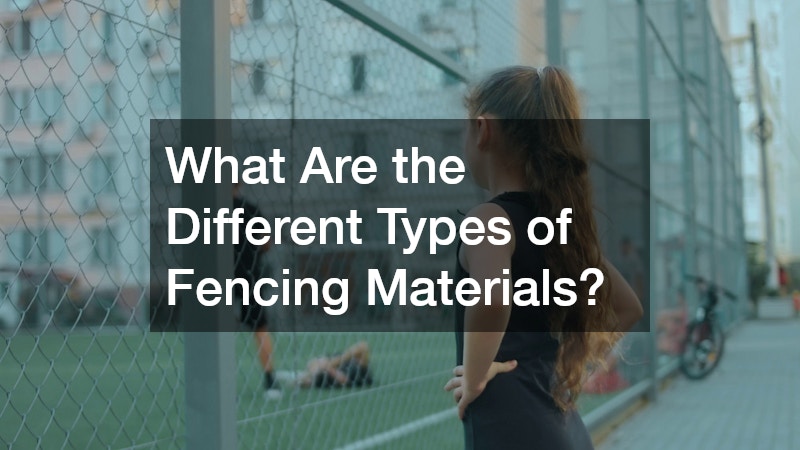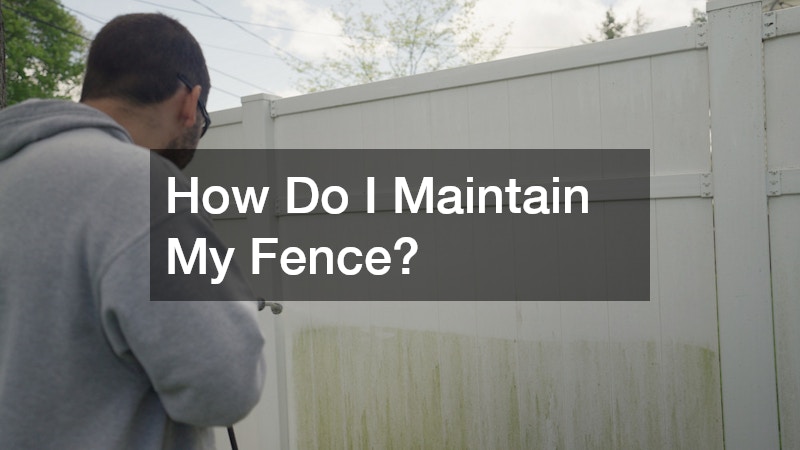For every house expert, understanding fencing is a crucial part of homeownership and property management. Whether it’s for privacy, security, or curb appeal, the right fence can dramatically improve the value and comfort of a home. Fencing is more than just a boundary marker—it’s an integral feature that balances aesthetics with functionality. Many homeowners have questions about which fencing materials to choose, how to maintain their fences, and what legal hurdles they might face during installation.
This article delves into everything a house expert should know about fencing—from the different types of materials available to installation tips and common costs. We’ll also explore how to select the right fence installer, understand local regulations, and maintain your investment over time.
What Are the Different Types of Fencing Materials?

Wood Fencing
Wood fencing remains a popular choice among house experts for its natural beauty and versatility. Lumber materials used for wood fences include cedar, pine, and redwood, each with distinct characteristics. Wood fences provide excellent privacy and can be customized with stains or paints to match any home’s exterior. However, wood requires regular maintenance to prevent rot, warping, and insect damage. Over time, a house expert knows that wood fences may need repainting, sealing, or repairs, but their warm, classic appeal makes them worth the effort.
Vinyl Fencing
Vinyl fencing offers a durable and low-maintenance alternative to wood. Made from PVC, vinyl fences resist rot, insects, and weather damage far better than traditional wood. Fence companies often recommend vinyl for homeowners who want a clean, uniform appearance without the upkeep. While the upfront cost of vinyl fencing is typically higher, its longevity and ease of care make it a smart investment. Vinyl fences can also mimic the look of wood, combining aesthetic appeal with practicality.
Metal Fencing
Metal fences, particularly those made of iron or aluminum, are favored for their security benefits. Iron fences provide a classic, sturdy barrier that enhances both safety and curb appeal. Aluminum fencing, meanwhile, is lightweight and resistant to rust, making it ideal for humid or coastal environments. A house expert will point out that metal fences often require occasional power washing and painting to keep them looking their best. Security-conscious homeowners value metal fencing for its strength and longevity.
How Do I Choose the Right Height for My Fence?
Recommended Heights for Privacy Fencing
Privacy fences typically range from six to eight feet tall, depending on local regulations. House experts advise that the ideal height balances blocking unwanted views while avoiding a closed-in feel. Taller fences offer more seclusion but may require permits or be restricted by zoning laws. Many homeowners choose six feet as a standard height for backyard privacy while maintaining neighborhood harmony.
Height Considerations for Security Fencing
For security purposes, fence height can be a deterrent to intruders. Fence installers often recommend heights of eight feet or more, sometimes topped with additional security features like spikes or cameras. However, a house expert knows that overly tall fences can draw attention or violate community guidelines, so it’s crucial to research local restrictions before installation.
Local Zoning Regulations
Every area has specific zoning regulations governing fence height, location, and materials. These rules exist to maintain safety, aesthetics, and neighbor relations. A house expert will always check with local municipalities or homeowner associations to ensure compliance before starting any fencing project. Failure to adhere to these regulations can result in fines or mandated removal of the fence.
What Are the Costs Associated with Installing a Fence?
Material Costs
Building material supply choice significantly affects overall fencing costs. Wood is generally less expensive upfront but requires ongoing upkeep. Vinyl and composite fence services come at a higher initial cost but offer better durability and lower maintenance. Metal fences, depending on the design and thickness, can range widely in price. A house expert carefully balances budget and longevity when advising on material selection.
Labor Costs
Hiring a professional fence installer can increase the cost but ensures proper installation and longevity. Labor expenses depend on the fence length, terrain complexity, and type of materials used. Complex sites requiring excavation or construction equipment may incur additional fees. Experienced fence companies offer transparent quotes that detail labor and potential extra charges.
Additional Factors Affecting Cost
Other variables impacting the total price include site preparation, permits, and repair of existing landscaping. An excavation company might be needed for clearing or leveling uneven ground. A house expert reminds homeowners to budget for power washing if replacing or refreshing an existing fence, as well as potential repair or staining supplies.
How Do I Maintain My Fence?

Regular Inspections
Routine inspections are key to spotting damage early. House experts recommend checking fences seasonally for loose boards, rust spots, or signs of insect damage. Early detection can save money by preventing minor issues from becoming major repairs.
Cleaning Methods
Effective cleaning depends on the fence material. Power washing is highly effective for wood, vinyl, and composite fences, removing dirt, mold, and stains. For metal fences, gentle scrubbing with soapy water can prevent corrosion. Fence companies often suggest annual cleaning schedules to maintain appearance and extend fence life.
Repairs and Upkeep
Common repairs include replacing broken boards, tightening screws, or repainting metal sections. A house expert advises that timely maintenance not only preserves beauty but also structural integrity. Many homeowners hire fence installers for periodic upkeep to ensure the fence remains safe and attractive.
What Is the Best Way to Install a Fence?
Planning and Design
Successful fence installation begins with careful planning. Measuring the property accurately and designing the layout to account for gates, slopes, and existing landscaping are crucial first steps. A house expert stresses the importance of considering how the fence complements the home’s architecture and purpose.
Tools and Equipment Needed
DIY fence installation requires a variety of tools, including post hole diggers, levels, hammers, and saws. Construction equipment such as augers may require an excavation service, especially for larger projects. While a house expert might handle smaller jobs personally, they recommend hiring professional fence installers for complex sites.
Step-by-Step Installation Process
Generally, installation starts with setting posts deep in the ground, followed by attaching rails and then the fence panels or pickets. Ensuring posts are level and secure is essential for fence durability. A house expert notes that precision during installation directly impacts the fence’s lifespan and appearance.
Are There Any Legal Restrictions on Fencing?
Zoning Laws and Regulations
Before installing a fence, it’s vital to understand local zoning laws. These regulations control fence height, location, and sometimes even materials to ensure neighborhood consistency. House experts encourage consulting city or county offices early in the planning phase.
Property Line Considerations
Disputes often arise when fences encroach on neighbors’ properties. Accurately identifying property lines via surveys can prevent conflicts. A house expert will always recommend verifying boundaries before installation to avoid costly legal issues.
Permits and HOA Regulations
Many municipalities require permits for fence installation, particularly for taller fences or those in front yards. Additionally, homeowner associations may have their own guidelines or approval processes. Navigating these rules is a crucial step, and working with an experienced fence company can help streamline compliance.
What Are the Benefits of Installing a Fence?

Privacy and Security
Fencing adds an immediate layer of privacy, shielding outdoor spaces from passersby and neighbors. It also enhances security by deterring intruders and keeping pets or children safely enclosed. House experts know that the right fence design can balance openness and protection.
Aesthetic Value
Fences define a home’s curb appeal and add architectural interest. Whether it’s a classic wood picket fence or sleek metal panels, fencing can complement landscaping and building style. Many homeowners find that well-chosen fencing increases property value and neighborhood appeal.
Defining Boundaries
Beyond aesthetics, fences clearly mark property lines and establish boundaries. This clarity is essential for avoiding disputes and managing outdoor spaces effectively. A house expert understands that fences create a sense of order and ownership on the property.
What Are Common Fencing Styles?
Picket Fencing
Picket fences are iconic for their charming, traditional appearance. Often painted white, they are popular around front yards and gardens, evoking a classic, welcoming feel. House experts appreciate picket fences for their balance of visibility and boundary definition, allowing homeowners to define property lines without completely blocking views. These fences can be crafted from wood or vinyl, with vinyl versions offering greater durability and less maintenance. Additionally, picket fencing is versatile enough to be customized with different picket shapes, heights, and spacing to complement various architectural styles, making it a favorite for those who want both function and aesthetic appeal.
Chain Link Fencing
Chain link fences are utilitarian, offering a budget-friendly solution for enclosing large areas efficiently. While less decorative, they provide durability and security, making them ideal for backyards, playgrounds, and commercial properties. Fence companies often recommend chain link for pet containment or commercial applications because it withstands heavy use and requires minimal upkeep. Chain link fencing can also be coated with vinyl in different colors, enhancing visual appeal and corrosion resistance. For house experts, the practicality of chain link fences is a big plus, especially for properties where security and visibility are priorities without obstructing light or airflow.
Privacy Panels
Privacy panel fences use tall, solid boards or composite fence services to create an opaque barrier that blocks views and noise. They are favored by homeowners seeking maximum seclusion and a clear boundary from neighbors or street traffic. These fences often require professional installation to ensure tight seams and structural integrity, which is crucial to prevent gaps or warping over time. Composite materials, in particular, provide resistance to rot and insect damage while mimicking the look of wood without the same maintenance demands. House experts note that privacy panel fencing can also increase property value by enhancing the usable outdoor space with a sense of security and comfort.
How Can I Choose a Fence Contractor?
Research and Recommendations
Start by researching local fence companies and reading customer reviews online to get a sense of reputation and quality. House experts recommend seeking referrals from neighbors, friends, or home improvement forums where people share their firsthand experiences. Gathering multiple recommendations can help identify trustworthy contractors who offer fair pricing and reliable service. Additionally, researching a contractor’s licensing, insurance, and certifications provides peace of mind. A house expert understands that due diligence at this stage can prevent future headaches and ensure your fencing project runs smoothly.
Interviewing Contractors
Prepare thoughtful questions about experience, estimated timelines, warranties, and materials used to ensure the contractor aligns with your needs. Clear communication during interviews helps clarify expectations and avoids misunderstandings down the line. A house expert advises asking about previous projects similar to yours and how they handle unexpected challenges. Getting multiple quotes allows for comparison not just on price, but also on service quality and professionalism. This process empowers homeowners to choose a contractor who is transparent and trustworthy.
Checking References and Reviews
Always verify references by contacting previous clients to ask about their satisfaction with the contractor’s work, timeliness, and post-installation support. Reviewing portfolios or visiting completed projects can provide a better sense of craftsmanship and attention to detail. Reliable contractors are proud to share their work and have satisfied customers willing to vouch for them. This step helps avoid surprises and ensures a smooth installation process. House experts emphasize that these checks are essential for confirming the contractor’s reputation beyond online reviews.
What Should I Consider for Fence Longevity?

Material Durability
The choice of materials heavily influences the lifespan of a fence. Composite fence services and vinyl fences generally outlast traditional wood but may come with a higher upfront cost. Metal fences, particularly those made from treated iron or aluminum, offer decades of use when properly maintained. House experts consider durability alongside environmental factors when advising clients on material selection. For example, a fence that can withstand high humidity or pest pressure may justify additional investment. Material warranties and resistance to common issues like cracking, warping, or rust are also important factors to review.
Weather Resistance
Climate plays a significant role in how fences age over time. Areas with heavy rain, snow, or intense sun require materials that can withstand these harsh elements without deteriorating quickly. For instance, power washing is an effective method to clean and restore wood or composite fences after harsh weather, removing mildew, dirt, and stains. Protective coatings or sealants can also extend fence life by preventing water penetration and UV damage. House experts recommend regular weatherproofing treatments to help fences maintain structural integrity and appearance year-round.
Installation Quality
A fence’s durability depends as much on installation as on materials. Poorly set posts or uneven panels can lead to premature failure through leaning, warping, or gaps that allow moisture infiltration. Hiring experienced fence installers and excavation companies ensures a strong foundation and precise construction. Correct post depth, alignment, and securing methods contribute to fence stability, especially in areas with strong winds or shifting soils. House experts emphasize that investing in quality installation upfront reduces costly repairs and replacements in the future.
Conclusion
A comprehensive understanding of fencing is essential for every house expert. From choosing the right materials like lumber materials, vinyl, or metal to knowing how to maintain and legally install fences, this knowledge helps homeowners protect and beautify their properties. Working with reputable fence companies and contractors ensures quality workmanship and peace of mind.


